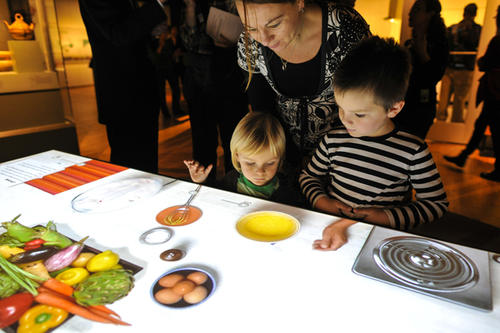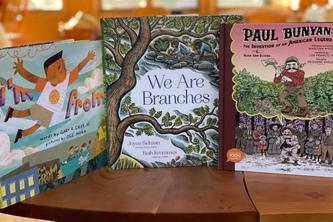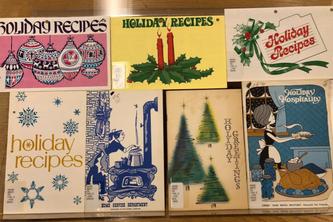
Food does more than keep us alive. Meals are the places where families meet, business is conducted and where our senses are stimulated. Food connects us to the land, to cultural heritage, and to each other.
The Bell Museum’s new exhibit: Our Global Kitchen: Food, Nature, Culture, on loan from the American Museum of Natural History, opens to the public on Saturday, September 29, 2018. Our Global Kitchen illuminates the complex and intricate food system that brings what we eat from farm to fork. Craft digital meals in an interactive kitchen. Sit in the dining rooms of famous historical figures. Take a glimpse at the future of food.
“This exhibit asks us to renew our appreciation for how we grow and gather our food,” said Don Luce, Curator of Exhibits. “We hope visitors will look at something they all do every day—eat—and think about centuries of farmers and cooks that shaped our food, global celebrations and traditions, and how the natural environment supports the foods we rely on.”
Today’s global food economy also binds us to the 1 billion people working in agriculture—from a rice farmer in Vietnam and an oyster farmer in France to researchers in our own backyard at the University of Minnesota. In this exhibit, visitors will experience the intersection of science, culture and health—and consider some of the most challenging issues of our time.
"Cooking is an art, and the challenge today is to make it as healthy and sustainable as it is delicious and beautiful," said Holly Menninger, Director of Public Engagement and Science Learning. "Questions about the future of food are presented so well in the exhibit, and we are excited to invite U of M experts and local communities together to continue exploring where we go from here."
Exhibit Highlights
- A life-size re-creation of a 16th-century Aztec marketplace
- Scent stations featuring vital ingredients used in everything from candy to fish dishes
- Period rooms depicting the tables of illustrious individuals throughout history: Roman empress Livia Drusilla, Mongolian ruler Kublai Khan and British author Jane Austen
- An interactive table, where visitors “cook” famous dishes from around the world—Groundnut Soup (West Africa), Tamales (Mexico), Poached Eggs with Hollandaise Sauce (France), and Grilled Salmon and Peach Salad (U.S.).
- A “waste sculpture” containing the amount of food a U.S. family of four wastes per year: 1,656 pounds
- Utensils and cookware from around the globe, in addition to a selection of historic, classic, and even humorous cookbooks
Special Events
The Bell Museum will further explore intriguing food questions during the run of the exhibit that are inspired by University of Minnesota research as well as Minnesota’s diverse cultural connections to food. Upcoming events include:
Food Fest (Oct 6-7)
A family-friendly weekend featuring the latest innovations in food science from harnessing the power of microbes to developing new plant varieties and caring for your home garden. Special guests, food art, hands on science, and food trucks all weekend long. Free with museum admission.
Petri Dish: Super Foods or Super Frauds (Oct 10)
Are coffee, chocolate and eggs friends or foes? Sorting out what’s true and not true in food-related research findings can be tricky. Join us for a special series of curiosity-driven conversations with U of M experts. Tickets $10, includes admission to Our Global Kitchen. Additional events feature foodborne illness (Nov 14) & our ever-evolving diet (Dec 12).
Reclaiming the Culture of Indigenous American Cuisine (Oct 16)
Sean Sherman, Oglala Lakota and founder of The Sioux Chef, will share insights about Native American farming, harvesting, cooking techniques, land stewardship and cultural history. The lecture will be followed by a book-signing, along with light refreshments prepared by Sherman’s catering team.
Visitor Information
Our Global Kitchen: Food, Nature, Culture is open to the public from September 29, 2018 through January 6, 2019. Tickets include admission to both Our Global Kitchen and the museum’s permanent galleries: $12 for adults, $10 for seniors (65+) and $9 for youth (3–21). Bell Museum Members are free. Visit bellmuseum.umn.edu/global-kitchen for details.
Additional Resources
Image downloads
Exhibit images are available for download via: z.umn.edu/ourglobalkitchen
Exhibition Organization
Our Global Kitchen is organized by the American Museum of Natural History, New York (amnh.org).
About the Bell Museum (bellmuseum.umn.edu)
The Bell Museum is Minnesota’s official natural history museum, founded in 1872 and held in trust at the University of Minnesota. A proud part of the College of Food, Agricultural and Natural Resource Sciences, our mission is to ignite curiosity and wonder, explore our connections to nature and the universe, and create a better future for our evolving world. Our scientific collections hold over one million plant and animal specimens, showcasing biodiversity from across Minnesota and around the globe. In the museum’s newly opened facility, visitors can explore the far reaches of the universe in the Whitney and Elizabeth MacMillan Planetarium, see a glimpse of the diversity of life on Earth and throughout Minnesota, travel back in time to meet a woolly mammoth, and learn about U of M researchers and citizen scientists imagining a better future.
The Bell Museum strives to make its facility and events accessible to all. Audio description, ASL interpretation, or other accommodations can be arranged with a two-week notice. Contact the access office at 612-624-4268 or [email protected]. For general information, visit bellmuseum.umn.edu or find @bellmuseum on Twitter, Facebook, and Instagram.
About the American Museum of Natural History (amnh.org)
The American Museum of Natural History, founded in 1869, is one of the world’s preeminent scientific, educational, and cultural institutions. The Museum encompasses 45 permanent exhibition halls, including those in the Rose Center for Earth and Space and the Hayden Planetarium, as well as galleries for temporary exhibitions. It is home to the Theodore Roosevelt Memorial, New York State’s official memorial to its 33rd governor and the nation’s 26th president, and a tribute to Roosevelt’s enduring legacy of conservation. The Museum’s five active research divisions and three cross-disciplinary centers support approximately 200 scientists, whose work draws on a world-class permanent collection of more than 34 million specimens and artifacts, as well as specialized collections for frozen tissue and genomic and astrophysical data, and one of the largest natural history libraries in the world. Through its Richard Gilder Graduate School, it is the only American museum authorized to grant the Ph.D. degree. Beginning in 2015, the Richard Gilder Graduate School also began granting the Master of Arts in Teaching (MAT) degree, the only such freestanding museum program. Annual visitation has grown to approximately 5 million, and the Museum’s exhibitions and Space Shows are seen by millions more in venues on six continents. The Museum’s website, mobile apps, and MOOCs (massive open online courses) extend its scientific research and collections, exhibitions, and educational programs to additional audiences around the globe. Visit amnh.org for more information.
- Categories:
- Arts and Humanities





